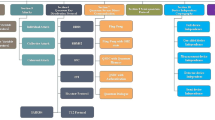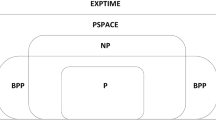Abstract
This paper presents a systematic approach for implementing arbitrary unknown multi-qubit state sharing by multiple agents and its generalization to independent state joint sharing collaborated with multi control agents in quantum deterministic and probabilistic networks. To supervise all independent processes of quantum state sharing, each control agent needs to hold and measure only one particle. This scheme can be used in multi-layer quantum networks to monitor the data flow in secured communication. The performance analysis shows that less qubit resources and less amount of classical communication information are required compared with existing schemes.
Similar content being viewed by others
References
Blakley, G.R.: Safeguarding cryptographic keys. In: Proceedings of the 1979 AFIPS National Computer Conference, pp. 313–317. AFIPS Press
Shamir A.: How to share a secret. Commun. ACM 22(11), 612–613 (1979)
Hillery M., Buzek V., Berthiaume A.: Quantum secret sharing. Phys. Rev. A 59(3), 1829–1834 (1999)
Cleve R., Gottesman D., Lo H.K.: How to share a quantum secret. Phys. Rev. Lett. 83(3), 648–651 (1999)
Karlsson A., Koashi M., Imoto N.: Quantum entanglement for secret sharing and secret splitting. Phys. Rev. A 59, 162 (1999)
Gordon G., Rigolin G.: Generalized quantum-state sharing. Phys. Rev. A 73, 062316 (2006)
Zhang Z.J., Man Z.X.: Multi party quantum secret sharing of classical messages based on entanglement swapping. Phys. Rev. A 72, 022303 (2005)
Yang C.P., Chu S.-I., Han S.: Efficient many-party controlled teleportation of multiqubit quantum information via entanglement. Phys. Rev. A 70, 022329 (2004)
Muralidharan S., Panigrahi P.K.: Quantum-information splitting using multipartite cluster states. Phys. Rev. A 78(6), 062333 (2008)
Nie Y.Y., Li Y.H., Liu J.C., Sang M.H.: Quantum information splitting of an arbitrary three-qubit state by using two four-qubit cluster states. Quantum Inf. Process. 10, 297–305 (2011)
Qin S.J. et al.: Cryptanalysis of the Hillery-Buzek-Berthiaume quantum secret-sharing protocol. Phys. Rev. A 76(6), 062324 (2007)
Deng F.G. et al.: Multiparty quantum-state sharing of an arbitrary two-particle state with Einstein-Podolsky-Rosen pairs. Phys. Rev. A 72(4), 044301 (2005)
Deng F.G. et al.: Quantum state sharing of an arbitrary two-qubit state with two-photon entanglements and Bell-state measurements. Eur. Phys. J. D 39(3), 459–464 (2006)
Shi R.H. et al.: Multi-party quantum state sharing of an arbitrary two-qubit state with Bell states. Quantum Inf. Process. 10, 231–239 (2011)
Liu J., Liu Y.M., Zhang Z.J.: Generalized multiparty quantum single-qutrit-state sharing. Int. J. Theor. Phys. 47(9), 2353–2362 (2008)
Wang T.J., Zhou H.Y., Deng F.G.: Quantum state sharing of an arbitrary m-qudit state with two-qubit entanglements and generalized Bell-state measurements. Physica A 387(18), 4716–4722 (2008)
Zheng S.B.: Splitting quantum information via W states. Phys. Rev. A 74, 054303 (2004)
Man Z.X., Xia Y.J., An N.B.: Quantum state sharing of an arbitrary multiqubit state using nonmaximally entangled GHZ states. Eur. Phys. J. D 42, 333 (2007)
Zhang W. et al.: Generalized scheme for splitting arbitrary 2-qubit state with three -qubit entangled states. Int. J. Theor. Phys. 48, 2834–2842 (2009)
Yuan H. et al.: Optimizing resource consumption, operation complexity and efficiency in quantum-state sharing. J. Phys. B: At. Mol. Opt. Phys. 41, 145506 (2008)
Sheng Y.B., Deng F.G., Zhou H.Y.: Efficient and economic five-party quantum state sharing of an arbitrary m-qubit state. Eur. Phys. J. D 48(2), 279–284 (2008)
Shi R.H. et al.: Asymmetric five-party quantum state sharing of an arbitrary m-qubit state. Eur. Phys. J. D 57, 287–291 (2010)
Shi R.H. et al.: Asymmetric multi-party quantum state sharing of an arbitrary m-qubit state. Quantum Inf. Process. 10, 53–61 (2011)
Brown I.D.K., Stepney S., Sudbery A., Braunstein S.L.: Searching for highly entangled multi-qubit states. J. Phys. A 38, 1119 (2005)
Wang X.W. et al.: Scheme for implementing controlled teleportation and dense coding with genuine pentaqubit entangled state in cavity QED. Opt. Commun. 282, 670 (2009)
Xiu X.M. et al.: Quantum key distribution protocols with six-photon states against collective noise. Opt. Commun. 282, 333 (2009)
Li X.H. et al.: Efficient symmetric multiparty quantum state sharing of an arbitrary m-qubit state. J. Phys. B. At. Mol. Opt. Phys. 39(8), 1975–1983 (2006)
Hou K. et al.: An efficient scheme for five-party quantum state sharing of an arbitrary m-qubit state using multiqubit cluster states. Quantum Inf. Process. 10, 463–473 (2011)
Tittel W., Zbinden H., Gisin N.: Experimental demonstration of quantum secret sharing. Phys. Rev. A 63(4), 042301 (2001)
Tyc T., Sanders B.C.: How to share a continuous-variable quantum secret by optical interferometry. Phys. Rev. A 65, 042310 (2002)
Xia Y., Song J., Song H.S.: Quantum state sharing using linear optical elements. Opt. Commun. 281, 4946 (2008)
Zhou P. et al.: Multiparty quantum secret sharing with pure entangled states and decoy photons. Physica A 381, 164 (2007)
Jiang M. et al.: Faithful teleportation of multi-particle states involving multi spatially remote agents via probabilistic channels. Physica A 390, 760–768 (2011)
Jiang, M., et al.: Faithful teleportation via multi-particle quantum states in a network with many agents. Quantum Inf. Process. doi:10.1007/s11128-011-0228-z
Muralidharan S., Panigrahi P.K.: Perfect teleportation, quantum-state sharing, and superdense coding through a genuinely entangled five-qubit state. Phys. Rev. A 77, 032321 (2008)
Martín a A. et al.: Control-flow integrity principles, implementations, and applications. ACM Trans. Inf. Syst. Secur. 13(1), 4–1440 (2009)
Dong D. et al.: Quantum reinforcement learning. IEEE Trans. Syst. Man Cyber. Part B: Cyber. 38(5), 1207–1220 (2008)
Chudnov, A., Naumann, D.A.: Information flow monitor inlining. In: 23rd IEEE Computer Security Foundations Symposium, pp. 200–214. IEEE press (2010)
Chang, W., Streiff, B., Lin, C.: Improving application security with data flow assertions In: Proceedings of the 15th ACM Conference on Computer and Communications Security, pp. 39–50. ACM press (2008)
Deng F.G., Long G.L., Liu X.S.: Two-step quantum direct communication protocol using the Einstein-Podolsky-Rosen pair block. Phys. Rev. A 68, 042317 (2003)
Yang C.P., Guo G.C.: Disentanglement-free state of two pairs of two-level atoms. Phys. Rev. A 59, 4217 (1999)
Hans A., Briegel J.H.: Security proof of quantum cryptography based entirely on entanglement purification. Phys. Rev. A 66, 032302 (2002)
Dong R.F. et al.: Experimental entanglement distillation of mesoscopic quantum states. Nat. Phys. 4, 919–923 (2008)
Hage B. et al.: Preparation of distilled and purified continuous-variable entangled states. Nat. Phys. 4, 915–918 (2008)
Dong D., Petersen I.R.: Sliding mode control of quantum systems. New J. Phys. 11, 105033 (2009)
Dür W., Briegel H.J.: Entanglement purification and quantum error correction. Rep. Prog. Phys. 70, 1381 (2007)
Smolin J.A., Verstraete F., Winter A.: Entanglement of assistance and multipartite state distillation. Phys. Rev. A 72, 052317 (2005)
Chen L., Xu A.M., Zhu H.J.: Computation of the geometric measure of entanglement for pure multiqubit states. Phys. Rev. A 82, 032301 (2010)
Michael S., Fritzsche F.S.: Evolution equation for entanglement of multiqubit systems. Phys. Rev. A 82, 062327 (2010)
Heydari H.: Topological quantum gate entanglers for a multi-qubit state. J. Phys. A: Math. Theor. 40, 9877–9882 (2007)
Author information
Authors and Affiliations
Corresponding author
Rights and permissions
About this article
Cite this article
Jiang, M., Dong, D. & Wu, R. Multiple independent quantum states sharing under collaboration of agents in quantum networks. Quantum Inf Process 11, 1829–1844 (2012). https://doi.org/10.1007/s11128-011-0337-8
Received:
Accepted:
Published:
Issue Date:
DOI: https://doi.org/10.1007/s11128-011-0337-8




